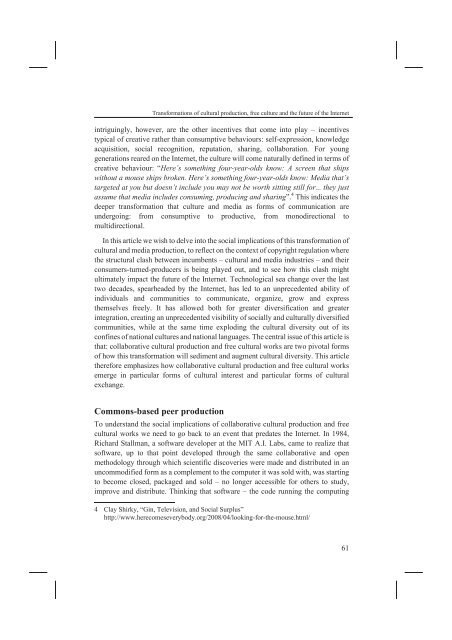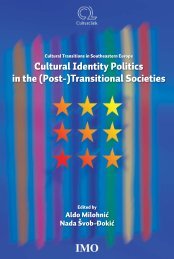D:\Documents and Settings\Ana\My Documents\Biserka-knjiga ...
D:\Documents and Settings\Ana\My Documents\Biserka-knjiga ...
D:\Documents and Settings\Ana\My Documents\Biserka-knjiga ...
Create successful ePaper yourself
Turn your PDF publications into a flip-book with our unique Google optimized e-Paper software.
Transformations of cultural production, free culture <strong>and</strong> the future of the Internet<br />
intriguingly, however, are the other incentives that come into play – incentives<br />
typical of creative rather than consumptive behaviours: self-expression, knowledge<br />
acquisition, social recognition, reputation, sharing, collaboration. For young<br />
generations reared on the Internet, the culture will come naturally defined in terms of<br />
creative behaviour: “Here’s something four-year-olds know: A screen that ships<br />
without a mouse ships broken. Here’s something four-year-olds know: Media that’s<br />
targeted at you but doesn’t include you may not be worth sitting still for... they just<br />
assume that media includes consuming, producing <strong>and</strong> sharing”. 4 This indicates the<br />
deeper transformation that culture <strong>and</strong> media as forms of communication are<br />
undergoing: from consumptive to productive, from monodirectional to<br />
multidirectional.<br />
In this article we wish to delve into the social implications of this transformation of<br />
cultural <strong>and</strong> media production, to reflect on the context of copyright regulation where<br />
the structural clash between incumbents – cultural <strong>and</strong> media industries – <strong>and</strong> their<br />
consumers-turned-producers is being played out, <strong>and</strong> to see how this clash might<br />
ultimately impact the future of the Internet. Technological sea change over the last<br />
two decades, spearheaded by the Internet, has led to an unprecedented ability of<br />
individuals <strong>and</strong> communities to communicate, organize, grow <strong>and</strong> express<br />
themselves freely. It has allowed both for greater diversification <strong>and</strong> greater<br />
integration, creating an unprecedented visibility of socially <strong>and</strong> culturally diversified<br />
communities, while at the same time exploding the cultural diversity out of its<br />
confines of national cultures <strong>and</strong> national languages. The central issue of this article is<br />
that: collaborative cultural production <strong>and</strong> free cultural works are two pivotal forms<br />
of how this transformation will sediment <strong>and</strong> augment cultural diversity. This article<br />
therefore emphasizes how collaborative cultural production <strong>and</strong> free cultural works<br />
emerge in particular forms of cultural interest <strong>and</strong> particular forms of cultural<br />
exchange.<br />
Commons-based peer production<br />
To underst<strong>and</strong> the social implications of collaborative cultural production <strong>and</strong> free<br />
cultural works we need to go back to an event that predates the Internet. In 1984,<br />
Richard Stallman, a software developer at the MIT A.I. Labs, came to realize that<br />
software, up to that point developed through the same collaborative <strong>and</strong> open<br />
methodology through which scientific discoveries were made <strong>and</strong> distributed in an<br />
uncommodified form as a complement to the computer it was sold with, was starting<br />
to become closed, packaged <strong>and</strong> sold – no longer accessible for others to study,<br />
improve <strong>and</strong> distribute. Thinking that software – the code running the computing<br />
4 Clay Shirky, “Gin, Television, <strong>and</strong> Social Surplus”<br />
http://www.herecomeseverybody.org/2008/04/looking-for-the-mouse.html/<br />
61



